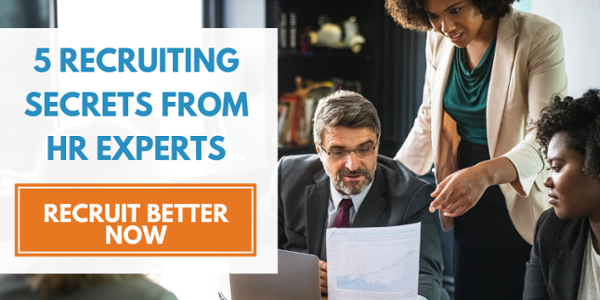Benefits of AI in Recruiting and HR
HR software has been a valued tool for the last 20 years because it automates many of the processes that used to take HR staff hours to accomplish. Hiring, onboarding, training, reviews and compliance are all simplified and accurate with technological solutions. Now within the last five years, HR software has gotten smarter from AI integrations.
AI, a.k.a. artificial intelligence, not only helps HR software automate processes, but it learns as it goes. Think of it like having an extra employee who can provide quick answers to applicants or pull relevant data. As with any new technology, AI in HR has its benefits and challenges.
Benefits of AI in HR
Not only does AI help take those repetitive recruiting and screening tasks off your plate (like capturing candidate information and scheduling interviews), it does so while enhancing the candidate experience. Research has shown that 80 percent of executives rate employee experience as important, but only 22 percent believe their company does a good job of it.
Consider how AI can boost your passive recruiting while providing a great candidate experience. AI used in HR can seamlessly deliver candidates directly to hiring managers, instead of career sites where they typically have to re-search for the job. With an AI recruiting assistant, like Olivia, applicants are directed to the job landing page for the AI assistant who can answer questions and direct them along in the application process. A better candidate experience leads to improved interview show rates and more interviews scheduled the same day, saving managers hours per week in the recruiting process.
AI used in HR can also help efficiently identify and recruit top talent without bias. An AI recruiter can perform screening tasks to identify the traits and abilities you desire in a candidate, then directly respond to the candidates who fit your criteria. Plus, it does it all without bias, helping to ensure you get a diverse workforce. AI can also improve experiences for your current employees in the areas of performance management, engagement, benefits and development.
Here's What HR Should Keep in Mind
Your data might need a cleanup
As with any piece of technology, it's only as good as its data. Without the right data sets, AI can't return the results you want. A good example of this is when Amazon discovered its AI was introducing bias because it has been trained on male-dominated resumes. Companies that integrate AI into its recruiting process need to make sure the data provided will get them the right results.
AI can't replace human connections
Another potential barrier could be applicants' familiarity with AI. As AI relies on chatbots and recruitment bots, the lack of personal interaction may turn some away. Although research shows that 66% of job seekers are comfortable interacting with chatbots and AI.
AI can't make decisions for you
Gaps between AI and human resource management are still being researched. For example, AI can't replace human decision making for areas like performance appraisal scores and who ultimately gets hired or fired. Think of AI as an assistant, not an actual HR director or recruiter.
AI may not be good at evaluating soft skills or to assess cultural fit. But, as an early recruiting tool, AI doesn't necessarily need to be. AI's strengths lie in the top of the candidate funnel. Once it does its magic to bring the best candidates to you, your HR department can then bring them further down the pipeline, making connections and filling positions.
BirdDogHR Recruiting AI and Texting - powered by Paradox - is a personal text and web-based chat assistant, configured to your specific company, that offers intelligent, dynamic and human-like conversations easily walk candidates through your entire recruiting process. Ready to meet Olivia? See a demo.




